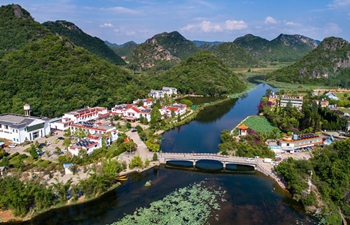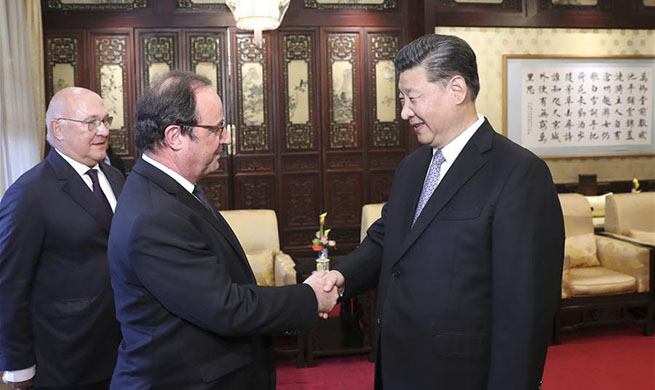MINSK, May 27 (Xinhua) -- In the eastern suburb of Minsk, capital city of Belarus, stands the China-Belarus industrial park, the largest foreign investment project in the country and an important cooperation project between China and Belarus under the Belt and Road Initiative.
Located right at the juncture between the Eurasian Customs Union and the European Union, Belarus -- the China-Belarus industrial park in particular -- is ready to forge a closer link between the two vigorous markets.
As of now, the rapidly developing industrial park, named Great Stone, is home to 34 resident enterprises, of which 18 are from China. Notable Chinese companies include diesel engine manufacturer Weichai Co., Ltd, telecommunications giant Huawei Technologies Co., Ltd, China Merchant Group Ltd (CMG), among others.
The 34 enterprises so far represent eight countries, China, Belarus, Russia, the United States, Germany, Austria, Lithuania and Israel, making the park a multinational business hub.
Buoyed by the support of the governments of China and Belarus, infrastructure facilities covering 3.5 square km of the park's first phase have been completed, and supporting facilities for the whole of the 8.5-square-km first phase are being built.
The largest project inside the park to date, in terms of construction and investment, is the China-Belarus trade and logistics subpark, whose first phase, in which CMG has invested 141 million U.S. dollars, covers a total area of 100,000 square meters.
The subpark has already signed contracts with European supermarkets to provide storage and logistics services for them. While speeding up the establishment of a bonded logistics area within the industrial park, CMG is also planning to cooperate with Germany's Duisburger Hafen AG to construct a railway directly linking the park with the China-Europe rail lines, which are providing freight services to meet the ever increasing demands of both sides.
Transportation of China Railway Express via Belarus has been growing rapidly. In 2017, over 2,700 freight trains traveled from China to Europe via Belarus.
"We plan to increase this number to 5,000 a year by 2020. This will create an opportunity for Belarus to expand (the) export of milk, beef, chicken and other foods to China," Belarusian Prime Minister Andrei Kobyakov said in an exclusive interview with Xinhua recently.
According to Hu Zheng, board member of CMG and the group's chief representative in Central Asia and the Baltic region, since becoming a stakeholder of the industrial park's development company, CMG has put forward the vision of a comprehensive logistics system encompassing roads, air routes, railways and sea transportation, with the industrial park being a base.
This comprehensive system, Hu added, is expected to open a grand logistics pathway from the Pacific Ocean to the Baltic Sea, making the China-Belarus industrial park one of the distribution centers for goods in Central Asia and Europe.
"An important content of CMG's involvement in the Belt and Road Initiative is to combine the specific advantages of individual enterprises with the development needs of the countries along the Belt and Road," Hu said.
Weichai began constructing its factory in the park a month ago, with the first batch of diesel engines expected to be built by the end of the year. In addition, other projects by Chinese enterprises involving such sectors as unmanned vehicles, drones and architectural designs are busy preparing for operations as well.
Given the industrial park's adjacency to the Minsk National Airport -- the international aviation hub of Belarus -- high-tech products produced here can be easily delivered to consumers in the Eurasian Customs Union as well as the European Union.
Belarus views the industrial park as a strategic project that gives hope for the country's future economic development, giving it an unprecedented preferential tax policy.
"For us, the park represents the future direction of the development of the Belarusian economy. It will contribute to the economic growth of our country and boost its export potential," Kobyakov said.
The goal of the China-Belarus industrial park is to build an international industrial hub as well as an eco-friendly industrial city, said Hu.
It is foreseeable that such an important project will be a platform for Chinese enterprises to seek overseas cooperation under the framework the Belt and Road Initiative, he added.

















